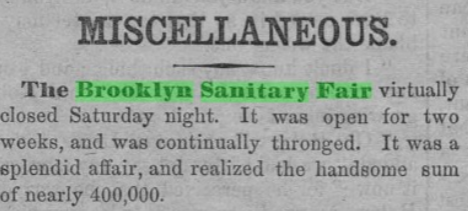“The Brooklyn sanitary fair was a magnificent affair.”
Lavinia Goodell, March 10, 1864
In 1864, Lavinia Goodell was living in Brooklyn with her parents and working with her father in editing the Principia anti-slavery newspaper. In her spare time, Lavinia enjoyed taking in cultural events and expositions. In March of 1864, along with thousands of other people, she visited the Brooklyn sanitary fair.

During the Civil War, sanitary fairs were held to raise money for the war effort in major cities in the Northeast. (Read more about them here.) The fairs combined entertainment, education, and philanthropy. Although the United States Sanitary Commission was headed by men, most of its work was accomplished by thousands of women volunteers. In Brooklyn, the hugely successful sanitary fair raised $400,000, well above the projected $100,000. The money was used for clothing, food, medical supplies, and other provisions for the Union Army.
The fair was eagerly anticipated and widely advertised. A polka was even composed in its honor. The song’s publisher proclaimed it “a perfect gem.”

The fair opened on February 22, 1864 at the Brooklyn Academy of Music. The New York Times reported:
At an early hour immense throngs began to crowd every avenue surrounding the building, and at the time the public were permitted to enter, fears were entertained of serious accidents…. The whole affair may be expressed in the one word – jam.

Lavinia attended the fair in early March 1864 and expounded on its delights in a chatty letter to her sister, Maria Frost:
It was a magnificent affair…. The main body of the fair … was in the Academy of Music,… When you got tired of wandering around there you could go upstairs and … overlook the whole scene. That was perfectly delightful, and the multitudes of people were about as amusing as the articles displayed…. The “New England Kitchen” was as attractive as anything. It was quite funny. Old ladies dressed in very antiquated style were explaining, or serving out pork and beans, cider, rye bread, etc. at the tables…. Everybody was jolly. The old ladies talked very old-fashioned and made a great deal of fun. It looked very incongruous to see the most elegantly and fashionably dressed people sitting down at the plain tables and partaking of the homely fair.
Knickerbocker Hall, the other refreshment room, served up articles of more modern and fancy style…. The picture gallery was very fine. I looked some to see how ladies’ dresses were trimmed, on your account. I saw a good many “beau monde” sleeves, and they were generally trimmed with velvet.
The March 10, 1864 issue of the Principia contained a short notice, no doubt written by Lavinia, announcing that the fair had reached the end of its successful run.

Sources consulted: Lavinia Goodell’s letter to Maria Frost (March 10, 1864); New York Times (February 20 and 23, 1864); the Principia (March 10, 1864); Illustration from Brooklyn Public Library.








Speaking in 1864 of “old ladies dressed in very antiquated style” who “talked very old fashioned” is difficult to imagine. Would it be like comparing today to the very old fashioned ways of dressing and talking in the 1950’s, (Cool, daddy-o”) or was it more like the post Beatles 1960s psychadelic and bell bottoms (outta sight, man!) Or, maybe, since Lavinia was only just 26 at the time, something like the 1980’s (were we even that much different then?)